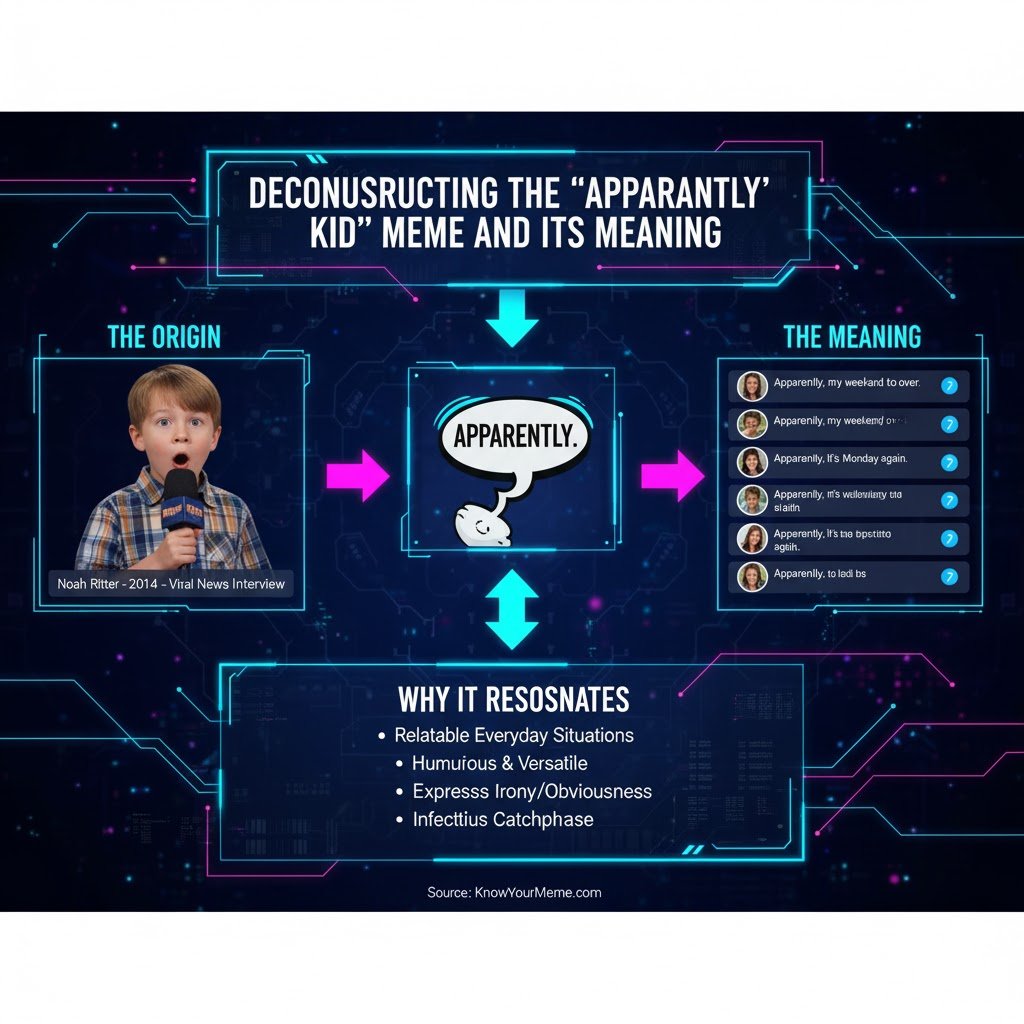In the ever-evolving lexicon of internet culture, certain phrases crystallize into something more than words—they become tonal shortcuts that convey a specific attitude and context. One such phrase is “Apparently Kid,” a meme that has transcended its origins to become a versatile tool for online communication. At its surface, it’s a simple, two-word pairing. But deconstructed, it reveals itself as a complex vehicle for irony, condescension, and a specific type of digital social posturing.
To understand the “Apparently Kid” meme, we must first break down its grammatical anatomy. The word “apparently” is an adverb used to convey that something seems to be true based on available evidence, often with an underlying hint of skepticism or secondhand information. The word “kid” is a simple noun for a child. However, when combined as “Apparently, Kid,” the comma becomes critical. It transforms the phrase from a statement about a child into a direct, patronizing address. The speaker isn’t describing a kid; they are addressing the listener as one.
The phrase functions as a powerful rhetorical device. It is almost exclusively used as a response, typically to someone the speaker believes is misinformed, naive, or overly confident about a subject. By placing “apparently” at the front, the respondent frames the listener’s own statement as being both obvious and newly revealed, feigning a sense of shared discovery. The kicker, of course, is the “kid.” This is the condescension engine of the phrase. It immediately establishes a power dynamic, positioning the respondent as the wiser, more experienced adult and the listener as a foolish child who has just stumbled upon a basic truth.
The meme’s virality is deeply rooted in the psychology of online interaction. Social media platforms, particularly sites like Twitter and Reddit, are often arenas for performative expertise and heated debate. “Apparently, Kid” is the perfect weapon in these skirmishes. It allows a user to dismiss an opponent’s entire argument with a single, biting phrase that projects intellectual superiority and cool detachment. It’s a way to win a argument not through superior logic, but through tonal dominance.
Furthermore, the phrase is a close cousin to other patronizing internet retorts like “Thanks, Captain Obvious” or the older “Well, actually…” However, “Apparently, Kid” carries a unique flavor. It’s less about correcting a fact and more about mocking the other person’s entire demeanor and delivery. It’s a response to perceived arrogance, effectively saying, “You just stated the obvious with the confidence of someone who thinks they’re revealing a profound secret, and I find that adorable and pathetic.”
The evolution of “Apparently Kid” showcases a common meme lifecycle. It likely originated in niche online forums or comment sections before being captured in screenshot form and shared on meme hubs like Instagram and TikTok. Its usage has since expanded. It can now be found in image macros over pictures of unimpressed individuals, used in video voiceovers, and has even been absorbed into everyday vernacular for a certain digitally-native demographic.
In conclusion, the “Apparently Kid” meme is far more than a passing trend. It is a linguistic artifact of modern internet debate culture—a culture characterized by quick retorts, perceived expertise, and the constant jockeying for social standing. It encapsulates a very specific kind of dismissive irony that resonates deeply in environments where tone is everything and putting someone in their place is a prized skill. The next time you see it deployed, you’ll understand it’s not just two words; it’s a carefully crafted tool for social one-upmanship.
FAQ: The “Apparently Kid” Meme
Q1: Where did the “Apparently Kid” meme start?
The exact origin is hard to pin down, as is common with internet phrases. It organically emerged from online debate cultures on platforms like Twitter, Reddit, and imageboards, where users developed it as a shorthand for a patronizing clapback. It gained wider recognition through screenshot shares and meme pages.
Q2: How should I use the “Apparently Kid” meme?
It is used as a standalone response to someone who has stated something obvious, well-known, or incorrect with a high degree of confidence. For example, if someone says, “I just found out that coffee has caffeine in it!” a fitting meme response would be, “Apparently, Kid.”
Q3: Is using the meme considered toxic?
It can be, depending on the context. Its primary function is condescension and dismissal. While often used in a lighthearted, joking manner among friends, when used in a genuine argument, it is deliberately provocative and designed to belittle the other person, which can escalate conflicts.
Q4: What are some similar memes or phrases?
The “Apparently Kid” meme exists in the same family as phrases like:
- “Thanks, Captain Obvious”
- “Well, actually…”
- “Tell me you don’t understand X without telling me you don’t understand X”
- The “And everybody clapped” sarcastic retort.

